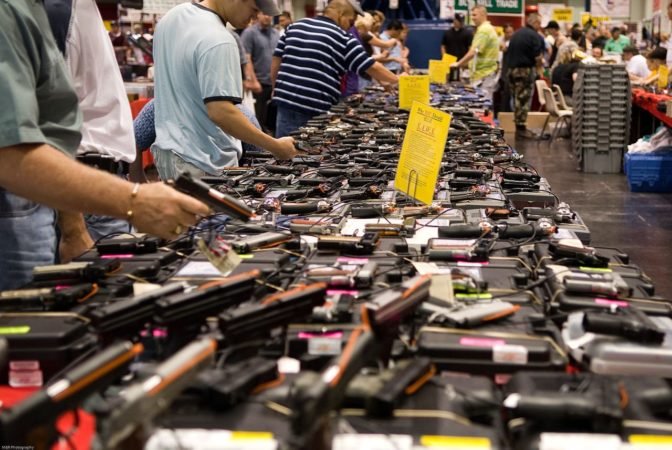New Zealand’s gun laws are strict compared to America’s, but there are gaps

On Friday, 50 people were killed in mass shootings at the Al Noor and Linwood mosques in Christchurch, New Zealand. And now it’s looking likely that New Zealand will strengthen its restrictions on guns — with Prime Minister stating on Friday that “our gun laws will change,” citing, among possible reforms, “a semiautomatic gun ban.”
As it stands, New Zealanders do not have a legal or constitutional right to own guns, and the small island country has strong gun laws relative to the US (as is true for developed nations in general). But the laws have some gaps, particularly when it comes to the registration of firearms and the regulation of semiautomatic weapons. These gaps have led to contentious debates in the country: Some gun owners don’t want tougher laws, while police have come to see the current legal framework as “patchy,” as reported by Stuff, a media company in New Zealand.
New Zealand has more than 1.2 million civilian-owned firearms — about one gun for every four people, according to Small Arms Survey, which provides estimates for gun ownership around the world. That puts the country in the top 20 nations in the world for civilian gun ownership (though still far behind the US, which has more than one gun for every person).
Still, New Zealand generally has very low levels of gun violence — likely due, in part, to its restrictions on firearms. But because of the remaining gaps and Friday’s terrorist attacks, there are already calls, including from the prime minister, to strengthen the country’s laws.
How New Zealand’s gun laws currently work
As the US’s Law Library of Congress explained, New Zealand’s system mainly focuses on licensing, but registration of firearms is not always required.
In New Zealand, people first have to obtain a license to legally purchase, own, and possess a gun. A license applicant is vetted to check for a criminal record, a history of violence, drug and alcohol use, and relationships with potentially dangerous people, among other factors. The applicant also must go through a firearms safety course. That all typically takes months to get through.
Once a person makes it through the process, he’s allowed to purchase guns and ammo — although some types of firearms, like handguns and certain semiautomatic rifles, require “endorsements” from police and separate permits to purchase. There are also extra storage and inspection requirements.
The licenses have to be renewed every 10 years, and police can revoke a person’s license if that person is believed to no longer be fit for ownership and may pose a threat.
Gun sellers are also licensed and regulated by police.
Unlike other licensing systems (such as Massachusetts’s), firearms in New Zealand don’t always have to be registered. This can lead to bizarre circumstances in which a gun only has to be slightly modified to no longer require registration.
Under the law, for instance, some semiautomatic rifles — commonly known as assault weapons — have to be registered as military-style semiautomatic rifles (MSSAs). But as Thomas Manch explained at Stuff, what is required to be registered and what isn’t can often come down to weird technicalities: Just inserting a lower-capacity magazine into an AR-15, an assault rifle, can make the weapon not required to be registered.
It’s also possible to import certain parts meant for MSSAs but for non-MSSA weapons, essentially letting a person modify a non-MSSA gun to become more dangerous, like an MSSA, without having to go through the legal hurdles tied to an MSSA.
Police have long worried that the gaps and loopholes make it easier for the wrong people to obtain and keep firearms. It’s unclear if that’s what happened with the Christchurch shooter, although he did get his guns legally, according to the prime minister.
Despite the concerns, New Zealand’s gun laws haven’t gone through significant changes since a mass shooting led to reforms in 1992. Amendments passed in 2012 did clarify some of the rules around registered assault weapons, but the changes were largely technical and minor.
It remains to be seen whether the push to strengthen the country’s gun laws following the March 15 attacks will be successful.
Gun control works, but it has limits
Stricter gun laws can’t stop all shootings. But the research shows that where there are stronger gun laws, and fewer guns, there are generally fewer gun deaths.
A 2016 review of 130 studies in 10 countries, published in Epidemiologic Reviews, found that new legal restrictions on owning and purchasing guns tended to be followed by a drop in gun violence — a strong indicator that restricting access to guns can save lives. A review of the US evidence by RAND also linked some gun control measures, including background checks, to reduced injuries and deaths.
Laws that require a license to buy and own a gun seem to be particularly effective, based on US studies. In Connecticut, researchers looked at what happened after the state passed a permit-to-purchase law for handguns — finding a 40 percent drop in gun homicides and a 15 percent reduction in handgun suicides. In Missouri, researchers looked at the aftermath of the state repealing its handgun permit-to-purchase law — finding a 23 percent increase in firearm homicides but no significant increase in non-firearm homicides, as well as 16 percent higher handgun suicide rates.
A recent study also found that weaker gun laws and higher levels of gun ownership were correlated with more mass shootings at the state level.
There’s a bit of common sense to this: Every country has bigots, extremists, and criminals, but looser gun laws, like the US’s, make it significantly easier to actually obtain firearms and use them for awful things. To this end, previous empirical analyses have concluded that the US doesn’t have more crime, generally, than other developed nations, but it does have more lethalcrime, like murder — in large part thanks to easy access to firearms.
New Zealand, for its part, generally has few gun homicides. According to GunPolicy.org, the entire country had just eight gun homicides in all of 2015 — a rate of 0.18 firearm homicides per 100,000 people. In comparison, the US, which has the loosest gun laws among wealthy nations and far more gun deaths as a result, had nearly 13,000 gun homicides that year — a rate of 4.04 per 100,000.
The mosque shootings on March 15 effectively add up to six years’ worth of gun homicides in New Zealand — a testament to how awful the attacks were, but also to how rare such events are in the country.
German Lopez is a Senior Correspondent at VOX. He wrote this originally for VOX



















